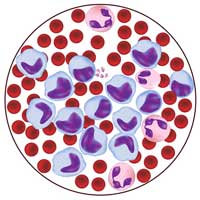Tuberculosis :: Promising New TB Drug Enters Clinical Trial
A promising new drug candidate that may be effective against both actively dividing and slow-growing Mycobacterium tuberculosis (M. tb) has begun testing in humans, the National Institute of Allergy and Infectious Diseases (NIAID), part of the National Institutes of Health, announced today. The novel antibiotic, PA-824, may shorten the time needed to treat tuberculosis (TB), a contagious disease that claims approximately two million lives worldwide each year. In partnership with the non-profit New York-based Global Alliance for TB Drug Development (TB Alliance), NIAID contributed to the drug candidate?s preclinical safety and efficacy testing in animal models. Now, a clinical trial to assess PA-824?s safety, sponsored by the TB Alliance, has opened at a medical clinic in Lincoln, NE.
